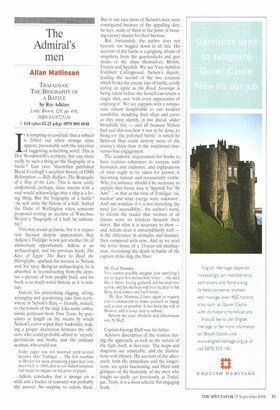The Admiral's men
Allan Mallinson
TRAFALGAR:
THE BIOGRAPHY OF
A BATTLE by Roy Adkins Little. Brown, £20, pp. 416, ISBN 0316725110 £18 (plus £2.25 p&p) 0870 800 4848
It is tempting to conclude that a subject is fished out when strange titles appear, presumably with the intention of suggesting something novel. This is Dot Wordsworth's territory, but can there really be such a thing as `the biography of a battle'? Last year, Macmillan published David Cordingly's excellent history of HMS Bellerophon — Billy Ruffian: The Biography of a ship of the Line. This is more easily understood, perhaps, since anyone with a soul would acknowledge that a ship is a living thing. But the biography of a battle? 'As well write the history of a ball,' huffed the Duke of Wellington when someone proposed writing an account of Waterloo. Would a 'biography of a ball' be admissible?
This may sound pedantic, but it is important because despite appearances Roy Adkins's Trafalgar is not just another bit of anniversary opportunism. Adkins is an archaeologist, and his previous book, The Keys of Egypt: The Race to Read the Hieroglyphs, sparked his interest in Nelson and 'his' navy. Being an archaeologist, he is absorbed in reconstructing from the detritus a picture of how people lived, and his book is as much social history as it is military.
Indeed, his painstaking digging, sifting, arranging and questioning take him everywhere in Nelson's fleet — literally, indeed, to the bowels of the ship. Like some enthusiastic professor from Time Team, he speculates at length on the means by which Nelson's crews wiped their backsides, making a proper distinction between the officers, who could probably afford to `recycle' periodicals and books, and the ordinary seaman, who could not:
Toilet paper was not invented until several decades after Trafalgar ... The first machine in Britain for mass-producing paper had only been built in 1803, and as yet industrialisation had made no impact on the price of paper. Adkins concludes that a sponge on a
stick and a bucket of seawater was probably the answer. No surprise to sailors there. But in any case most of Nelson's men were constipated because of the appalling diet, he says, many of them to the point of needing (straw) trusses for their hernias.
But, fortunately, the author does not become too bogged down in all this. His account of the battle is a gripping album of snapshots from the quarterdecks and gun decks of the ships themselves, British, French and Spanish. We see Vice-Admiral Cuthbert Collingwood, Nelson's deputy, leading the second of the two columns which broke the enemy line of battle, coolly eating an apple as the Royal Sovereign is being raked before she herself can return a single shot, and 'with every appearance of enjoying it'. We see captains with a composure almost inexplicable to our modern sensibility, steadying their ships and crews as they steer silently, in line ahead, under broadside fire — and all because Nelson had said this was how it was to be done, to bring on 'the pell-mell battle' in which he believed they could destroy more of the enemy's ships than in the traditional lineversus-line engagement.
The academic requirement for books to have copious references to sources, with footnotes and endnotes, and explanations of what ought to be taken for known, is becoming tedious and occasionally risible. Why, for instance, should it be necessary to explain that Santa Ana is 'Spanish for "St Ann" ', or that at the time of Trafalgar 'oil, nuclear and solar energy were unknown'. And one wonders if it is not stretching the need for 'accessibility', the author's word, to inform the reader that 'women of all classes wore no knickers beneath their skirts'. But what it is necessary to show — and Adkins does it extraordinarily well — is the difference in attitudes and manner, then compared with now. And so we read the letter home of a 13-year-old midshipman, recounting the death in battle of the captain of his ship, the Mars:
My Dear Mamma, You cannot possibly imagine how unwilling I am to begin this melancholy letter ... He died like a Hero, having gallantly led his ship into action, and his memory will ever be dear to his King, his Country and his Friends...
My dear Mamma, I have again to request you to endeavour to make yourself as happy and as easy as possible. It has been the will of Heaven, and it is our duty to submit.
Believe me your obedient and affectionate son, N. Duff.
Captain George Duff was his father.
Adkins's description of the tension during the approach, as well as the nature of the fight itself, is first-rate. The maps and diagrams are admirable, and the illustrations well chosen. His account of the aftermath, both the immediate and the longerterm, are quite fascinating, and filled with glimpses of the humanity of the men who fought so coolly yet ferociously at Trafalgar. Truly, it is a most eclectic but engaging book.


























































































 Previous page
Previous page